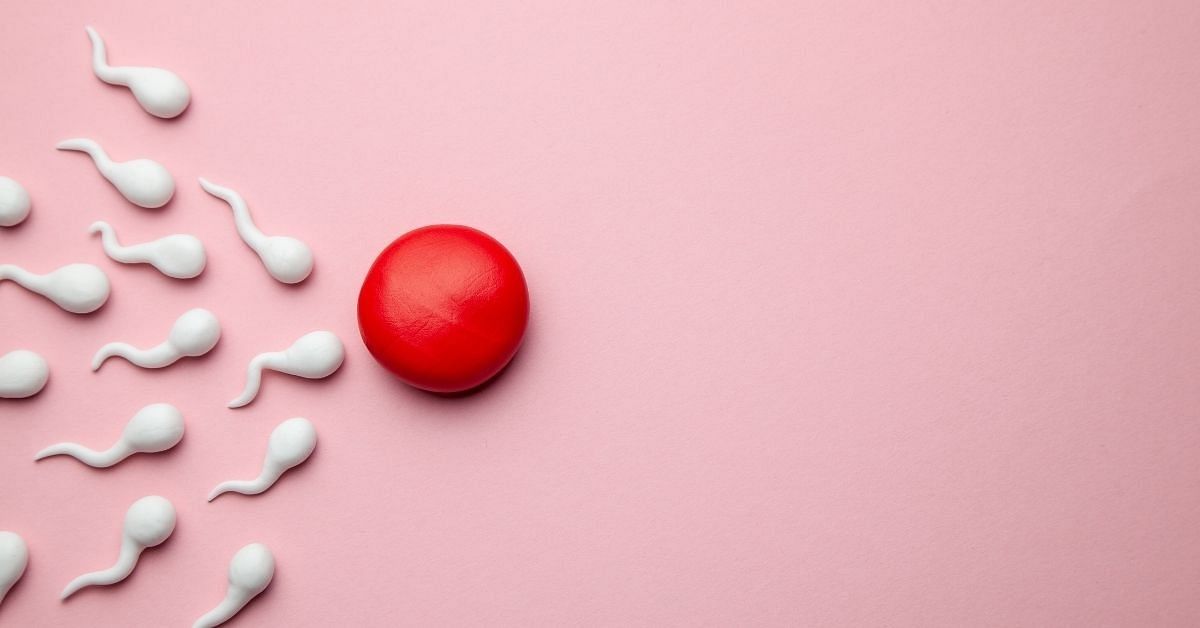How to Make Sperm Thicker and Stronger: 8 Proven Techniques That Work!
If you are experiencing fertility issues, you’re not alone. Infertility is more common than you might think. Click here to learn how to make sperm thicker and stronger!

Do you plan on having a child but are concerned about your sperm's strength and thickness when trying to conceive? That's okay; it's nothing to be embarrassed about.
According to Gary from ChivMen, a healthy baby depends on the well-being of both parents, the quality of sperm, and the quality of the egg from the mother.
A successful conception depends on many factors, and the most significant aspect concerning men is the quality and quantity of sperm. According to recent data, it appears that the quality of sperm, in general, has deteriorated by almost 50-60% in the last 40 years.

In this article, you will find a brief description of what to do if you are in this situation and how to make sperm thicker and stronger.
What is Male infertility?
Infertility is the failure to conceive even after regular unprotected coitus for one or more years. Globally, infertility has affected 8-12% of all couples. Among those couples, 30%–40% suffer because of male infertility, 40%–55% suffer from female infertility, and about 10% experience both infertility issues. In the remaining 10%, the cause is unclear.
Male infertility is when a man fails to make his female partner pregnant despite unprotected sexual intercourse. Men may experience infertility for many reasons, but the most common factor is an abnormality in the semen.
The semen is a fluid ejaculated from the male reproductive system that contains the sperm cells, which interact with the female egg to produce the progeny. In fact, according to research studies, abnormal semen is responsible for up to 90% of all male infertility cases.

Some of the causes of male infertility that affect sperm health are:
- Environment factors like smoking cigarettes and excessive alcohol consumption
- Obesity
- Thyroid dysfunction
- Erectile dysfunction
- Genetic defects
- Sedentary lifestyle
- Infection (mumps orchitis)
- Emotional stress
- Excessive exposure to high temperatures
- Tight clothing
- Exposure to pesticides and toxins
- Chronic serious diseases or malnutrition

How to Make Sperm Thicker and Stronger
While the primary cause of male infertility is low sperm quality, there are a number of things you can do to make your sperm quality better, thicker, and stronger.
So here is a healthy lifestyle and diet that you should follow if you’re wondering how to make sperm thicker and stronger:
1. Avoid a Sedentary Lifestyle
There are several reasons why sperm is watery and of poor quality; however, the most common is a sedentary lifestyle.
As per studies, westernized diets, high-fat diets, and obesity caused by sedentary lifestyles can double the risk of sperm DNA damage, resulting in diminished sperm quality.
Therefore, to develop healthy sperm and have healthy offspring, you need to avoid a sedentary lifestyle.

2. Exercise Daily
Lack of exercise is one of the major causes of many diseases. Besides being beneficial to immunity, mental health, cardiovascular health, and respiratory health, regular exercise also benefits sperm quality.
According to a study, regular exercise boosts testosterone levels, leading to better sperm quality. If you want to know how to make sperm thicker and stronger, you should start exercising regularly.
3. Quit Smoking
Smoking has several adverse effects on the body, including the respiratory system, the cardiac system, the nervous system, etc. Smoking hinders the functions of all bodily systems.
It has already been stated that smoking increases DNA damage and can lead to abnormalities in sperm, which in turn affects the quality of sperm.
Thus, if you are a smoker and want to have thicker and stronger sperm, now is the time to quit smoking.

4. Take Plenty of Vitamin C
Vitamin C is a well-known nutrient to enhance the immune system, but this vitamin also plays a key role in improving male fertility.
As per studies, oxidative stress contributes to male infertility. Vitamin C prevents this and may also improve sperm concentration and motility.
Therefore, it is best to include Vitamin C-rich foods in your diet and ensure you take a vitamin supplement under your doctor’s guidance.
5. Get Enough Vitamin D
Vitamin D deficiency is a common problem affecting all your body's systems, and recent research shows that it also affects the male reproductive system.
As per studies, an adequate amount of Vitamin D with its antioxidant and anti-inflammatory action helps in improving oxidative damage and protecting the sperm cells, resulting in improved sperm motility and quality.
Therefore, including Vitamin D is one of the best solutions of how to make sperm thicker and stronger.

6. Indulge in Stress Relief
The impact of psychological stress is always bad for health, not only for mental well-being but also for physical health.
Perhaps you are under stress at work or preparing for a family, in which case your stress level may increase. This will negatively impact the quality of your sperm.
Though the exact reason for this occurring is unclear, it is believed that stress can affect hormonal levels, which in turn affect the quality of sperm.
Therefore, you should indulge yourself in stress relief regimes, meditation, and yoga to reduce stress and, thus, get a solution on how to make sperm thicker and stronger.

7. Take Zinc
Zinc is a hormonal balancer that helps the functioning of the male hormone testosterone, the prostate gland, and other sexual health functions. It also acts as an antibacterial agent and helps to prevent bacterial infections.
In fact, zinc has been scientifically proven to be a source of nutrients essential for sperm health with several positive outcomes for preventing and managing male infertility.
8. Avoid Certain Medications
Every medication is not appropriate for every part of the body. Some have certain side effects that eventually hamper body functions.
Consequently, some medicines can adversely affect testosterone levels, affect the sperm structure, decrease their motility, and reduce their number.
Some of these medicines are:
- Antidepressant medications, specifically selective serotonin reuptake inhibitors (SSRIs)
- Calcium channel blockers used to manage hypertension and heart failure
- Anti-epileptic drugs like carbamazepine, phenytoin, and valproate show side effects resulting in shape change in sperm, lower sperm count, and poor quality.

What to Eat to Make Sperm Stronger
A balanced and healthy diet can contribute to stronger and healthier sperm. Here are 8 foods that can help improve sperm quality and production:
1. Fatty fish
Fish high in omega-3 fatty acids, such as salmon, sardines, and tuna, can improve sperm count, motility, and morphology. According to a study published in the Journal of Lipid Research, men who consumed more omega-3 fatty acids had higher sperm count and motility.
2. Spinach
Spinach is high in folate, which is necessary for healthy sperm production. A study published in the Journal of Andrology discovered that men with low folate levels were more likely to have abnormal sperm.
3. Walnuts
Walnuts contain arginine, an amino acid that promotes sperm motility and counts. According to a study published in the journal Biology of Reproduction, men who ate 75 grams of walnuts per day had better sperm vitality, motility, and morphology.

4. Eggs
Eggs are high in vitamin E, an antioxidant that can improve sperm quality. Men with higher vitamin E levels had better sperm motility and morphology, according to a study published in the Journal of Assisted Reproduction and Genetics.
5. Dark Chocolate
Dark chocolate contains flavonoids, which are antioxidants that can improve sperm count and motility. According to a study published in the journal Andrology, men who consumed dark chocolate had higher sperm count and motility than men who did not consume chocolate.

6. Tomatoes
Tomatoes contain a lot of lycopene, an antioxidant that can boost sperm count and motility. According to a study published in the journal Fertility and Sterility, men who consumed more lycopene had better sperm motility.
7. Pumpkin Seeds
Pumpkin seeds are high in zinc, which is necessary for healthy sperm production. Men with low zinc levels had lower sperm count and motility, according to a study published in the journal Fertility and Sterility.

8. Berries
Berries contain a lot of antioxidants, which can help with sperm quality. According to a study published in the Journal of Nutrition, men who consumed more antioxidants had better sperm motility and morphology.
Food Considerations for Thicker and Stronger Sperm
Studies show that Diet always plays an essential role in health. Eating processed foods, fatty dairy products, coffee, sugary drinks, sweets, potatoes, or an inadequate amount of fiber, vegetables, and fruits — all of it contributes to poorer quality sperm and low fertility.
To maintain overall health, your diet should include:
- Oily sea fish
- Nuts and seeds
- Bananas
- Fenugreek
- Spinach
- Eggs
- Oysters
- Garlic
- Walnuts
- Asparagus
- Ashwagandha
- Pomegranate

The above foods will boost the sperm's health, making it stronger and thicker, as food provides sperm with essential nutrients.
Adversely, inadequate nutrition affects the quality of sperm, its movement, its fusion with the female egg, and male fertility.
So, a change in lifestyle, especially regarding diet, is essential to tackle male infertility caused by poor semen quality.

Medical Options
The problem of thin, watery sperm is quite common; however, if you wish to know how to make sperm thicker and stronger with a medical approach, here are some medical options your doctor may recommend:
1. Diagnosis
Firstly, they identify the cause of the bad quality of sperm and then treat it accordingly. If the cause of your symptoms is an infection, you may consider antibiotics. But if it is due to a sexual problem, your doctor may also suggest counseling.
2. Hormonal Treatment
If your infertility is due to a low level of certain hormones or problems with the way your body uses hormones, your doctor may recommend hormonal treatment.
3. Surgical Options
If the cause of poor quality sperm or male infertility is any blockage in the male reproductive system, then surgery is an option.

How to Increase Sperm Volume Overnight
Here are some of the ways to increase sperm volume overnight -
1. Stay Hydrated
Water consumption is critical for maintaining healthy sperm levels. Dehydration can cause a decrease in sperm volume, so stay hydrated throughout the day.
2. Consume Nutritious Foods
Eating a well-balanced and nutritious diet is critical for sperm health and optimal sperm production. Include zinc, folate, vitamin C, and antioxidant-rich foods in your diet.

3. Avoid Excessive Alcohol
Both alcohol and tobacco can have a negative impact on your sperm count and volume. To improve your sperm health, try to limit or eliminate your consumption of these substances.
4. Practice Safe Sex
Unprotected sex increases your risk of sexually transmitted infections (STIs), which can harm your reproductive system and reduce sperm production. As a result, use condoms to protect yourself and your partner.

5. Manage Stress
Chronic stress can have a negative impact on sperm production and semen volume. Try stress management techniques such as deep breathing, meditation, or yoga to reduce stress and improve your overall health.
What is a Normal Sperm Count?
A normal sperm count is defined as at least 15 million sperm per millilitre of sperm. It is important to note, however, that sperm count is not the only factor that influences male fertility; sperm motility (ability to move) and morphology (shape) are also important. The standard test for evaluating male fertility is a semen analysis, which includes measurements of sperm count, motility, morphology, and other factors such as volume and pH. It is recommended that men who are having difficulty conceiving undergo sperm analysis to determine their fertility status.

How Do You Know if You Have Healthy Sperm?
There are several factors that are used to determine if a man has healthy sperm, including:
1. Sperm Count
A healthy sperm count is typically defined as having at least 15 million sperm per milliliter of semen.
2. Sperm Motility
Sperm motility refers to the ability of the sperm to move forward and swim through the female reproductive tract. At least 40% of the sperm should be motile for healthy sperm.

3. Sperm Morphology
The shape and size of sperm can affect its ability to fertilize an egg. A healthy sperm sample should have at least 4% normal morphology.
4. Semen Volume
A healthy semen sample typically has a volume of 1.5-5 milliliters.
5. pH and Other Factors
Other factors such as semen pH, liquefaction time, and the presence of white blood cells can also indicate the health of sperm.
If you are concerned about the health of your sperm, it is recommended to undergo a semen analysis test. This test will evaluate the above factors and provide information about your fertility status.

What Does Healthy Sperm Look Like?
Healthy sperm typically has the following characteristics:
1. Shape and Size
Normal sperm have an oval-shaped head and a long, slender tail that helps them move. Abnormalities in shape or size can affect their ability to fertilize an egg.
2. Sperm Motility
Healthy sperm are able to move forward and swim through the female reproductive tract. Rapid, straight-line movement is preferred, while slow or irregular movement can indicate a problem.

3. Volume and Color
A normal semen sample has a volume of 1.5-5 milliliters and is usually white or gray in color.
4. Texture
Healthy semen is usually thick and has a gel-like texture when it is first released, but it should liquefy within 15-30 minutes.

5. pH and Other Factors
A healthy semen sample typically has a pH between 7.2 and 8.0, and should not contain any blood or white blood cells.
Causes of Weak and Unhealthy Sperm
There are several factors that can contribute to weak and unhealthy sperm. Here are some of the most common causes:
1. Age
Men's sperm count and motility may decline as they age, and their sperm may become less healthy. This is due to the fact that the genetic material in sperm can become damaged over time.

2. Lifestyle Factors
Smoking, excessive alcohol consumption, drug use, poor diet, and lack of exercise can all contribute to sperm that is weak and unhealthy. These factors can result in oxidative stress in the body, which can harm sperm DNA.
3. Medical Conditions
Varicocele (enlarged veins in the scrotum), infections of the reproductive system, hormonal imbalances, and genetic disorders can all have an impact on sperm health.

4. Environmental Factors
Exposure to environmental toxins such as pesticides, heavy metals, and chemicals can affect sperm health. Men who work in jobs that involve exposure to these substances may be at higher risk.
5. Medications
Chemotherapy drugs, for example, can have an impact on sperm production and quality. Anabolic steroids, which are sometimes used by athletes to improve performance, can also suppress sperm production and cause infertility.

Thick Sperm Vs Watery Sperm
Sperm consistency varies from person to person and is affected by a number of factors such as age, diet, hydration level, and sexual frequency. In general, thicker sperm may indicate a higher sperm count, whereas watery sperm may indicate a lower sperm count or reduced sperm motility.
Thick sperm may appear opaque or whitish in color, whereas watery sperm may appear transparent. The appearance of sperm, however, is not always an accurate indicator of sperm count or quality.
If you are concerned about your sperm consistency, it is recommended that you speak with a healthcare provider. They can perform a semen analysis to assess sperm count, motility, and morphology and provide guidance on how to improve sperm health if necessary.

Summing Up
Sperm quality varies to a degree between people, but the quality is necessary for a successful conception. A healthy lifestyle is a must to increase sperm strength and thickness.
Taking care of your reproductive health is of the utmost importance. If your problem is not resolved through lifestyle adjustments, you should seek a proper medical consultation.
FAQs
How to Gain Energy Fast After Releasing Sperm?
After releasing sperm, the body may feel tired or drained due to the physical and hormonal changes that occur during ejaculation. It is critical to stay hydrated by drinking plenty of water and electrolyte-rich fluids such as sports drinks to regain energy quickly. Eating a well-balanced meal with protein, healthy fats, and complex carbohydrates can also provide the body with long-lasting energy. A short nap or relaxation techniques such as deep breathing or meditation can also help recharge the body and reduce stress levels. Exercising light to moderate can also increase energy levels by increasing blood flow and releasing endorphins.
Can Thick Sperm Cause Pregnancy?
Thick semen can make it more difficult for sperm to travel through the female reproductive tract and reach the egg for fertilization. However, thick sperm does not always indicate infertility, as it may still contain sufficient healthy sperm cells. The likelihood of pregnancy is determined by several factors, including the number and motility of the sperm, the timing of intercourse in relation to ovulation, and the female partner's overall fertility. As a result, while thick sperm reduces the likelihood of pregnancy, it does not necessarily rule it out. If a couple has trouble conceiving, they should see a fertility specialist for further evaluation and guidance.
Can Stress Cause Watery Sperm?
Stress is known to have a negative impact on overall health, including reproductive health. It can affect hormone levels, reduce sperm production and motility, and even cause changes in the appearance of semen, such as watery or thin consistency. This is because stress triggers the release of cortisol and other stress hormones, which can interfere with the production and function of sperm cells. In addition, stress can also lead to unhealthy habits such as smoking, drinking alcohol, and poor diet, which can further contribute to poor sperm quality. Therefore, it is important for men to manage stress levels through healthy lifestyle habits, such as regular exercise, meditation, and seeking support from friends or a mental health professional when needed in order to maintain optimal reproductive health.
Does Onion Increase Sperm Count?
Onions are a rich source of vitamins and minerals, including vitamin C, folic acid, and zinc, which are essential for overall health and may also have a positive effect on sperm count. Zinc, in particular, is a key nutrient for male fertility, as it helps regulate testosterone levels and supports the production of healthy sperm. Some studies have suggested that consuming onions or onion extract may help increase sperm count and motility, although more research is needed to confirm these findings.
Does Curd Increase Sperm Count?
Curd, also known as yogurt, is a dairy product that is rich in protein, calcium, and probiotics, which are known to be beneficial for digestive health. However, there is limited scientific evidence to suggest that curd can increase sperm count. Some studies have shown that consuming probiotics may improve semen quality, but the evidence is inconclusive and more research is needed.
Best Dry Fruits for Sperm Count?
Dry fruits are a rich source of essential nutrients that are beneficial for overall health, including reproductive health. Some studies have suggested that certain dry fruits, such as almonds, walnuts, and raisins, may help improve sperm count and motility. This is because they contain high levels of antioxidants, vitamins, and minerals that are necessary for the proper functioning of the male reproductive system. For example, almonds are a rich source of vitamin E, which has been shown to improve sperm motility and morphology, while walnuts contain omega-3 fatty acids that may help boost sperm count.
References
- Xuhong Yan, October 2019; Effects of physical exercises on semen quality and reproductive outcomes in male infertility - https://www.ncbi.nlm.nih.gov/pmc/articles/PMC6799391/#R4
- Kinga Skoracka, May 2020; Diet and Nutritional Factors in Male (In)fertility—Underestimated Factors - https://www.ncbi.nlm.nih.gov/pmc/articles/PMC7291266/
- Ali Fallah, June 2018; Zinc is an Essential Element for Male Fertility: A Review of Zn Roles in Men’s Health, Germination, Sperm Quality, and Fertilization - https://www.ncbi.nlm.nih.gov/pmc/articles/PMC6010824/

